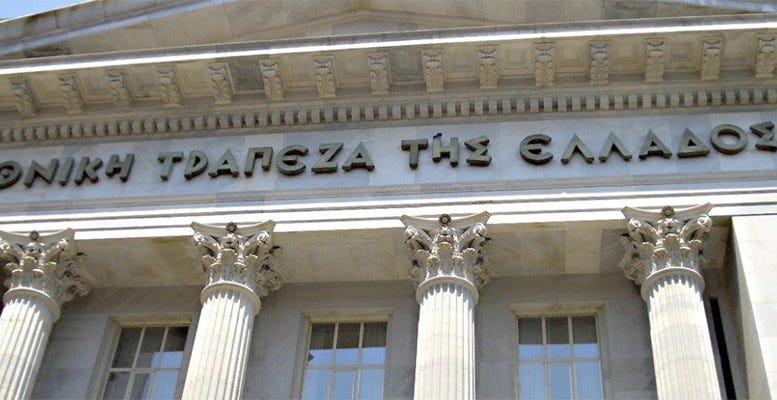An Athenian Odyssey
The Rehabilitation of Greece’s Banks
Net Interest catch-up service:
• This week’s podcast with Ted Seides was timely. After we recorded, news broke that hedge fund Millennium is in talks about selling a minority stake to external investors at a $14 billion valuation. It’s something Ted and I spoke about.
• This week, too, the US Senate passed the landmark GENIUS Act stablecoin bill. My piece, The New Money Market, provides all the background.
• And last week’s Secret Diary of a Hedge Fund Allocator was a big hit, with more than average shares. It’s one that won’t go stale.
On to this week’s topic:
An Athenian Odyssey
“Being early is indistinguishable from being wrong.” — Every trader I’ve ever known.
Late one November afternoon in 2015, I watched as Alpha Bank’s management team filed into my London office. They looked weary, and with good reason. Their bank, one of Greece’s largest lenders, had lost 85% of its market value that year alone. A summer of capital controls had devastated confidence in the Greek banking system. Deposits had fled, and shares across the sector were trading at a fraction of book value. Yet here they were, embarking on a roadshow to raise fresh capital – their third recapitalization in five years.
The year had been a brutal one for Greek banks. January’s election of the Syriza-led government, which had campaigned against the country’s bailout program, triggered six months of confrontational negotiations with European creditors. As uncertainty mounted over Greece’s future in the Eurozone, depositors rushed for the exits. By June, matters had reached crisis point. The announcement of a referendum on a new bailout agreement sparked such an intense bank run that authorities were forced to limit daily withdrawals to just €60. For Alpha Bank, the damage was already severe – in just six months, it lost 28% of its deposits.
Alongside its liquidity pressures, the bank was also struggling to collect on its loans. Over the past seven years, Greece had lost over a fourth of its GDP, and unemployment stood at 25%. This economic devastation had ravaged bank balance sheets. More than a third of Alpha’s loans were now non-performing; close to a half once other vulnerable exposures were factored in. A fresh review by European banking supervisors drove Alpha to book significant further provisions. Management argued theirs was “the lowest adjustment among peers,” but it was cold comfort. The entire Greek banking sector had been brought to its knees, with previous investors – both private and public – nursing massive losses. Some €37 billion that had poured into the system through two earlier recapitalizations had been all but wiped out.
Seated across the table, management walked me through their recovery plan. The Greek economy, they insisted, was at an inflection point – growth would resume by late 2016. New legislation would give them teeth to collect on bad debts. Deposits would flow back as customers regained confidence.
They didn’t flaunt it in the presentation materials but they also hinted at the attractions of a more concentrated marketplace. Smaller banks had fallen or been subsumed and foreign banks had exited, leaving the top five with 94% of the system’s assets, up from 68% in 2007 – the highest level of concentration in the European Union. Alpha itself had acquired Emporiki Bank and Citibank’s local retail banking operations over the past few years. This latest recapitalization offered a chance to participate in the newly-formed oligopoly and its recovery potential. Along with other international investors including Paulson & Co and Baupost, we decided to invest.
Unfortunately, the thesis took longer to unfold than we had anticipated. The economy did indeed begin to grow in the back half of 2016, but non-performing loans took a lot longer to work out. For the system as a whole, they remained above 40% of loans all the way through to 2020, placing a drag on performance. Having bought new shares at €2.00, investors didn’t see a sustained return for almost ten years – long after we exited our position. While the stock had briefly touched €2.00 several times before, it wasn’t until March this year that it decisively broke out.
I was in Athens recently (the Riviera, by the way, is well worth a visit).1 The transformation is remarkable. The economy is growing at more than 2% annually, outpacing the European average. Greek bond yields, once a barometer of crisis, now trade close to German levels – a convergence few thought possible in 2015. Most striking is the renewed confidence in Greek banks. In May, UniCredit announced plans to increase its stake in Alpha Bank to around 20%, building on an initial investment made last year. The move drew enthusiastic support from Greek officials, with the finance minister hailing it as evidence of “the robustness of the Greek banking system.” Nearly a decade after that weary management team walked into my London office, their story of resurrection is finding believers.
How did Greek banks navigate their way back from the brink? What changed to make a systemically important European bank want to take such a significant stake? And beyond the specifics of Alpha Bank’s recovery, what lessons does this story hold about the tail risks that accumulate in a system when debt keeps growing unchecked? To explore this remarkable turnaround, read on.

